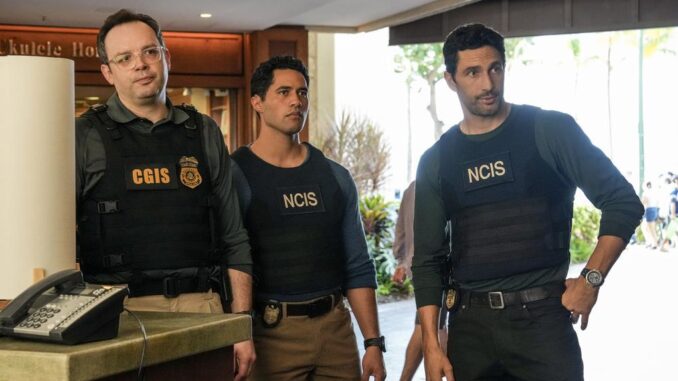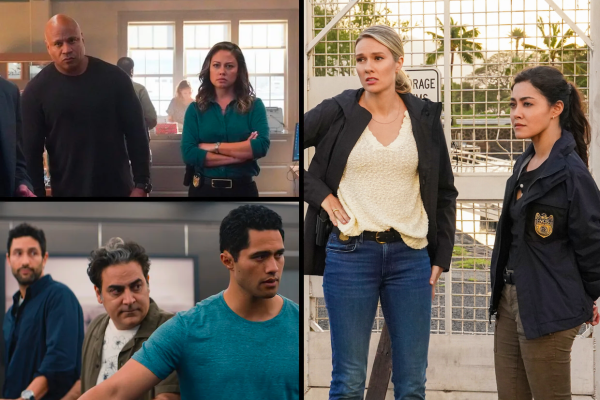
For starters, it doesn’t look like Hanna will be fully transferring to the Hawai’i field office. Given his recurring guest star role, it looks like he will still be operatizing out of the OSP office and occasionally showing up to assist Tennant’s team. That doesn’t sound like potential for a long-term relationship. If Tennant were to commit to a long-distance relationship, it would make more sense for Milius to fill that role, not Hanna.
It’s also possible that Hanna might still have a girlfriend. Back in NCIS: LA Season 11 and 12, Hanna was dating a Katherine Casillas. Granted, they could have broken up by now, it was never mentioned that they did. Additionally, NCIS; Hawai’i already has a marquee couple with Lucy and Whistler. Though a secondary couple wouldn’t necessarily take away from them, having Hanna and Tennant together wouldn’t feel like a secondary couple — because Tennant is the series’ lead, and Hanna is a well-established figure in the NCIS universe. For all of those reasons, it would be better if NCIS: Hawai’i avoided a romantic angle between Tennant and Hanna.
When Fictional Chemistry Turns Toxic
We’ve all had that moment watching a show or movie when two characters almost fall into a romantic rhythm—but something feels…off. That’s exactly the case with Tennant and Hanna. While some fans are waving the “ship it!” flags, others are slamming the brakes, and for good reason. So let’s break it down like real talk between friends—no fluff, just facts (and a few strong opinions).
Who Are Tennant and Hanna Anyway?
Tennant is the kind of character that walks into a room and owns it. Mysterious, bold, and brilliant—but with baggage. We’re talking emotional walls higher than a skyscraper and commitment issues for days.
Introducing Hanna – The Empathic Idealist
Hanna, on the other hand, is soft-spoken but strong, always trying to see the best in people. She’s that character who thinks love can heal all wounds. Admirable? Yes. Practical when dealing with someone like Tennant? Not so much.
Chemistry vs Compatibility – There’s a Big Difference
Just Because Sparks Fly Doesn’t Mean It’s Love
Tennant and Hanna do have chemistry—no denying that. But let’s be real: chemistry is like fireworks. It’s exciting, flashy, but burns out fast. Compatibility? That’s what builds a real relationship. And guess what? These two don’t have it.
Long-Term Stability Is MIA
Could you imagine Tennant opening up emotionally? Like, really opening up? Neither can we. Hanna wants vulnerability, communication, shared goals. Tennant wants…to avoid those things entirely. That’s a recipe for emotional disaster.
Their Relationship Dynamic Is Seriously Unbalanced
Tennant Takes, Hanna Gives — That’s Not Healthy
A balanced relationship needs give-and-take. But with Tennant and Hanna, it feels like she’s always the one reaching, fixing, and sacrificing. He leans on her emotionally, but rarely gives back. It’s not romantic—it’s draining.
The Power Imbalance Is Loud and Clear
Tennant often has the upper hand—smarter, more experienced, and emotionally distant. Hanna’s constantly playing catch-up, both emotionally and intellectually. That creates a weird mentor-mentee vibe, not a romantic partnership.
There’s Zero Growth When They’re Together
They Bring Out the Worst, Not the Best
Good couples push each other to grow. But Tennant and Hanna? They enable each other’s flaws. Tennant gets more guarded, Hanna becomes more of a martyr. That’s not love—that’s codependency.
Their Arcs Go Nowhere Romantic
When you look at their development individually, they shine. But together? It’s like watching a flower trying to bloom in the shade—pretty much impossible. Their connection stifles, not strengthens.
The Audience Deserves Better Storytelling
Forced Romance Kills Realism
Let’s face it—sometimes writers force couples to happen just because the fans are talking. But Tennant and Hanna’s connection feels more like a plot device than a natural evolution. It’s like watching a puzzle piece being jammed into the wrong spot.
There Are Better Pairings for Both
Why limit these dynamic characters to each other when there are so many others they’d thrive with? Tennant needs someone who challenges his walls. Hanna needs someone who embraces her emotional depth—not drains it.
Emotional Whiplash Isn’t Romantic
Hot and Cold Isn’t a Love Language
One episode they’re connecting, the next Tennant disappears emotionally. That rollercoaster isn’t passion—it’s confusion. Hanna deserves someone consistent, not someone who ghostwrites her trauma with mixed signals.

Fans Want Healthy Representation
We’ve Moved Past Toxic Tropes
Let’s stop glorifying emotionally unavailable men and the women who “fix” them. That’s an outdated trope. Relationships rooted in healing shouldn’t be one-sided. Hanna isn’t a therapist—she’s a human being.
Emotional Abuse Can Be Subtle
Not all toxicity screams. Sometimes it’s in the way Tennant withdraws, gaslights, or shuts Hanna down. It may be subtle, but it’s still harmful. That’s not something to romanticize.
Lack of Shared Values and Vision
What Do They Actually Have in Common?
Strip away the tension and trauma-bonding, and what are we left with? Not a lot. No shared hobbies, no aligned goals, and wildly different outlooks on life. That’s not just opposites attracting—that’s opposites colliding.
Their Best Scenes Are When They’re Apart
More Powerful as Individuals
Ever noticed how their characters shine brightest when they’re not together? Their solo arcs are fire. But put them together, and it’s like dimming a spotlight. That’s your sign right there.
Fans Deserve Emotional Payoff, Not Emotional Labor
Watching Their “Love Story” Is Exhausting
We tune in to feel, not to babysit characters through endless emotional loops. Tennant and Hanna’s dynamic is emotionally taxing to watch. Imagine how draining it would be to live.
Their Romantic Moments Feel Hollow
Where’s the Joy?
Romance should feel fun, safe, and warm—even during conflict. But their interactions often feel tense, dramatic, and joyless. Love isn’t supposed to feel like a battlefield every single day.
Conclusion: They Just Don’t Work — And That’s Okay
Some characters are better off apart. Tennant and Hanna may have tension, sparks, and a few compelling scenes, but love? That’s not what this is. It’s emotionally uneven, growth-stunting, and just not it. And that’s totally fine. Not every “almost” needs to be an “always.”
Let’s stop shipping toxic tension and start rooting for characters to find love that builds them—not breaks them.